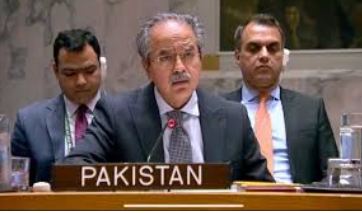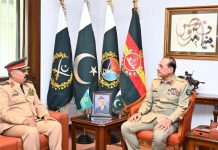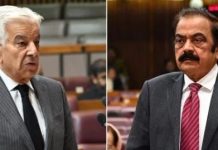Iftikhar Ali
UNITED NATIONS, AUG 23 (APP): Pakistan has called on the UN Security Council to address the root cause of the conflict in Eastern Democratic Republic of Congo (DRC), the illegal exploitation of its natural resources and to bring the Council’s full weight behind the efforts for peace in the region.
“The continuing deterioration in eastern DRC is a matter of grave concern for the international community and for this Council,” Ambassador Asim Iftikhar Ahmad, permanent representative of Pakistan to the UN, said in a debate on the situation in the Central African country.
“There is no military solution to the conflict,” he told the 15-member Council, adding, “Dialogue and diplomacy remain the only path forward.”
Despite diplomatic progress in recent months, with the United States brokering a peace agreement between the DRC and Rwanda, and Qatar facilitating a Declaration of Principles between the Congolese Government and the Rwandan-backed M23 rebels, tensions remain high in the eastern DRC – where multiple armed groups operate.
The Security Council has also sought to promote peace in the restive region, notably through its adoption of resolution 2773 in February 2025 calling upon all parties to refrain from violence against civilians. Still, casualties continue to rise in the east of the country.
In his remarks, Ambassador Asim Iftikhar Ahmad said that the full implementation of resolution 2773 was “imperative” for peace, as he denounced recent violence and killings of civilians in the Eastern DRC by M23, the Allied Democratic Forces (ADF) and other armed groups, while calling for the perpetrators of these acts to be held fully accountable.
“The M23 must cease hostilities, withdraw from areas captured and controlled by them, dismantle parallel structures, and engage constructively in dialogue.” he said.
“Any attempt to legitimize illegal control of territory by armed groups will only prolong instability.”
Pakistan, he said, had welcomed the peace agreement of 27 June between the DRC and Rwanda, facilitated by the United States, as well as the Doha Declaration of 19 July between the DRC government and the M23, facilitated by Qatar.
“These developments offer an opportunity to restore trust and lay the foundation for peace,” the Pakistan envoy said, but noting “regrettably” that the security situation on the ground was not corresponding to the diplomatic efforts.
“We urge all parties to abide by their obligations and work in good faith.”
Pakistan, he added, supports all ongoing regional and international efforts, including those of the United States, Qatar, and the African Union, urging the parties to seize this opportunity.
“Pursued in sync, and implemented with sincerity and genuine commitment by all those concerned, we believe these efforts can pave the way to de-escalation, reconciliation, and a durable and comprehensive peace.”
Opening the debate, Martha Ama Akyaa Pobee, Assistant Secretary-General for Africa in the UN Departments of Political and Peacebuilding Affairs and Peace Operations, pointed out that diplomatic gains fall short without a genuine ceasefire in the DRC, warning that the country is facing one of the most acute humanitarian emergencies worldwide.
“We cannot and must not accept the extreme suffering and recurrent horrors that are commonplace in eastern DRC,” she said.

















